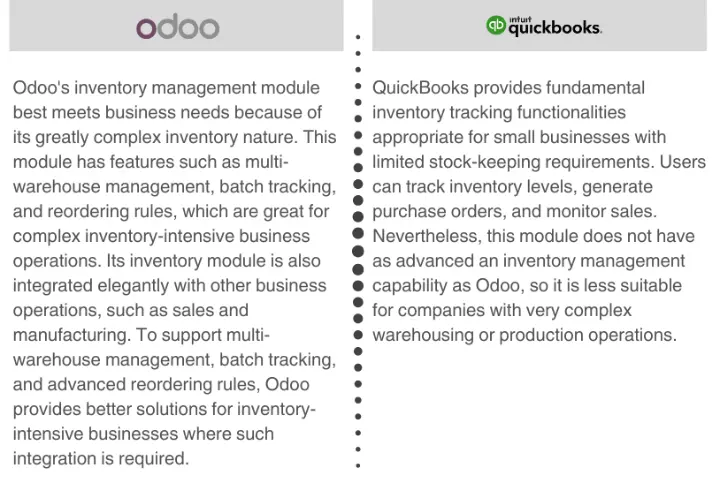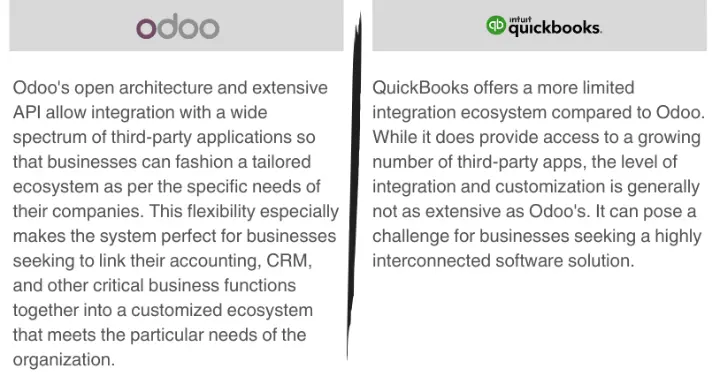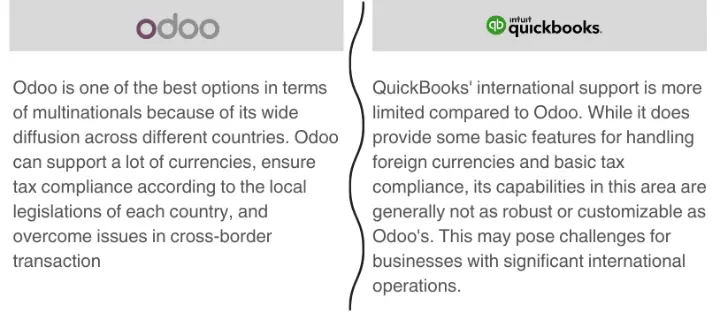As companies increasingly find it complex to operate in a frictionless financial landscape, accounting has emerged as the most important aspect of business management, responsible for managing an organization's financial well-being.
With various accounting software solutions available on the market today, it has become an important decision for businesses to select the appropriate solution. The important key is finding an accounting system that not only processes core financial functions but also integrates with indispensable business functions seamlessly. This can significantly return in terms of streamlined operations and resource optimization.
Under this exhaustive comparison, let's look at two of the industry's leading names - Odoo and QuickBooks. Do explore their numerous features and functionalities, user-friendliness, and suitability in aspects such as Accounting, Inventory management, CRM, etc. It would then help you come up with a decision that could fit the unique needs and growth plan of your organization.
Get ready to be introduced to the significance that makes these solutions stand out and find what could be the one to strengthen your company's financial status for years ahead.
1. Introduction
Accounting software has become an important business tool; without such software, no business can prosper. In this bid to find a more integral system that can align their financial management with other critical operations, the need to differentiate between Odoo and QuickBooks is of more relevance.
In this elaborate review, we'll be discussing the strengths and weaknesses of these two leading platforms, providing you with all the information required to make a choice that best fits to your organization's requirements.
2. Accounting and Financial Management
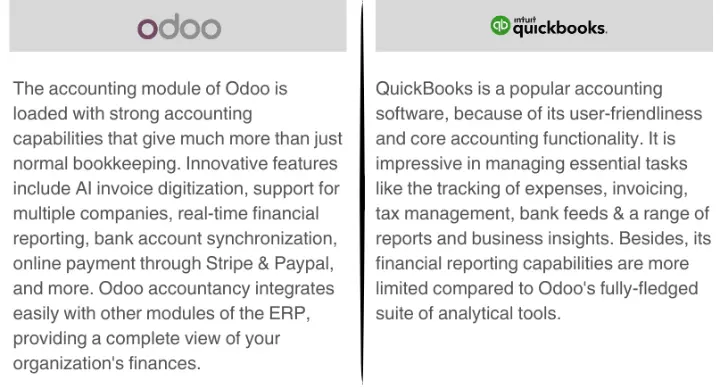
Example
For example, a small manufacturer that uses QuickBooks would be able to use the system easily to track inventory, generate invoices, and manage payroll. However, if they wanted to consolidate financial reports across multiple locations or create customized statements, Odoo's accounting module would be better suited.
3. Inventory Management
Example
While small retail shops using QuickBooks would be able to easily manage their inventory of a few dozen SKUs (Stock Keeping Units). A growing e-commerce business with multiple warehouses and thousands of products would benefit more from Odoo's robust inventory management capabilities, which can handle the increased complexity.
4. CRM and Sales Capabilities
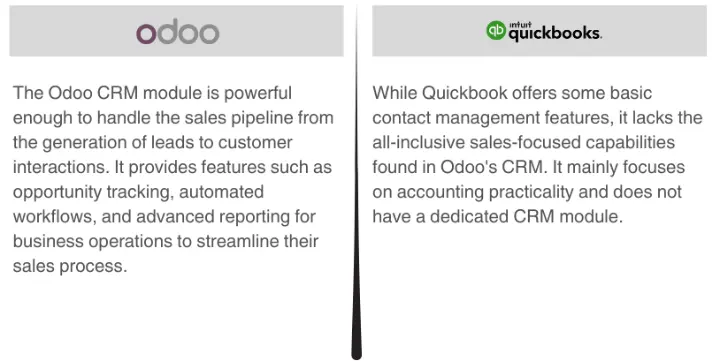
While QuickBooks excels in core accounting functions, the integrated CRM module of Odoo can allow a business to integrate its sales and financial management activities very precisely.
5. Ease of Use and Learning Curve
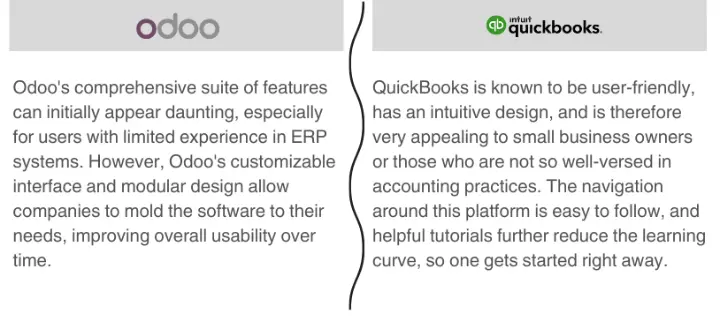
Example
A small company that is primarily a service and does not need complex accounting will find QuickBooks to be more user-friendly than Odoo, due to its simple interface and flow. A growing manufacturing firm that needs advanced management of inventory and financial reporting will find that Odoo better suits their scalable, customizable needs, despite the initial learning.
6. Customer Support
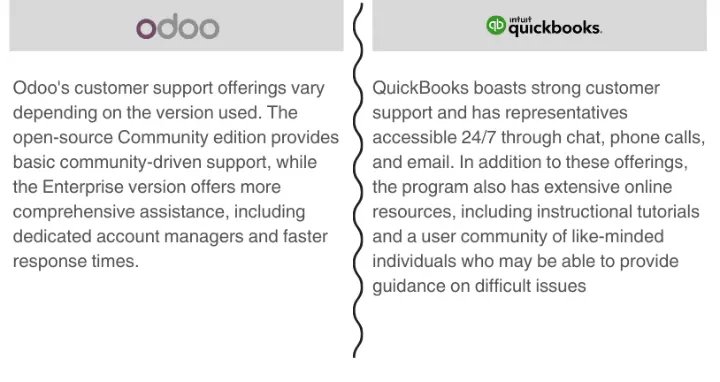
While both Odoo and QuickBooks generally offer good support services for customers, the level of assistance can vary depending on which version or plan a business chooses. Businesses should pay careful attention to their support needs when choosing between these two platforms.
7. Pricing and Scalability
Odoo offers a free Community edition as well as a paid Enterprise version priced per user and module. The initial investment for Odoo can be higher than QuickBooks, but its modular structure and scalability make it a cost-effective choice for growing businesses. On the other hand, QuickBooks operates on a subscription-based model, with pricing tiers ranging from $15 to $100 per month, depends on the features and number of users required. This makes QuickBooks more accessible for small businesses with limited budgets, but the costs can escalate as the business grows and needs additional functionality.
Pricing Table
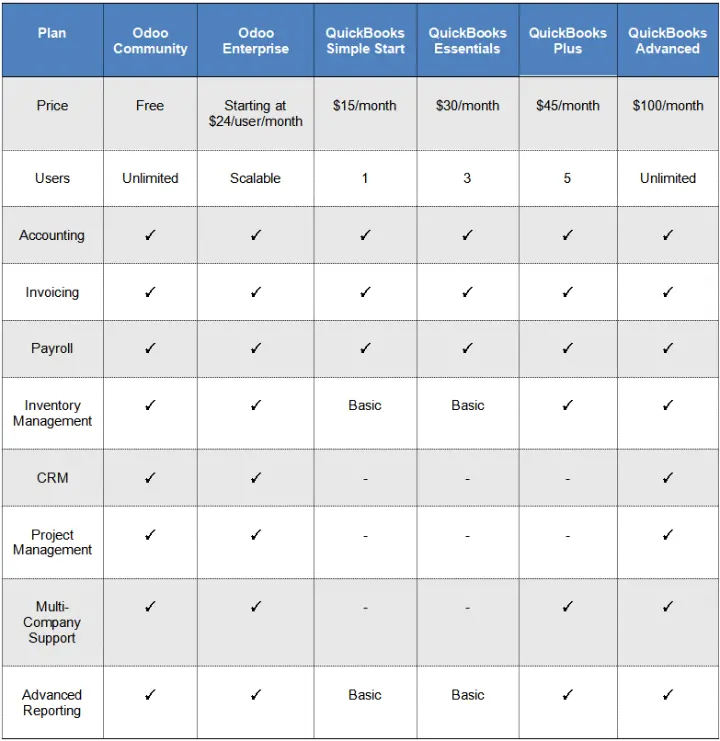
The choice between Odoo and QuickBooks ultimately comes down to balancing initial costs with long-term scalability and feature requirements. Business needs to assess the current and future requirements so that it could fix on a suitable platform.
8. Integration Capabilities
Example
An ecommerce business using QuickBooks is very likely to face issues in tight integration of their online shop, customer database, and shipping logistics. Odoo has a modular design and robust API, which would allow a more fluid and streamlined integration of these critical business functions.
9. Industry-Specific Functionalities
Odoo Vertical Solutions:
The modular architecture of Odoo has made industry-specific modules and customizations possible, where different businesses of various sectors can utilize this as a suitable choice. Whether in manufacturing, retail, or non-profit organizations, Odoo can be built for what each industry uniquely requires.
QuickBooks Industry Solutions:
QuickBooks has a more limited focus on industry-specific features, catering primarily to small businesses in general. While it does offer some industry-specific editions, such as QuickBooks for Contractors or QuickBooks for Nonprofits, the level of customization and depth of functionality is less extensive compared to Odoo's adaptable platform.
Example
A small law firm is likely to find the built-in features of QuickBooks to manage client trust accounts and generate legal-specific reports more suitable than trying to customize a generic accounting platform. On the other hand, a medium-sized manufacturing company is likely to benefit more from Odoo's ability to integrate advanced modules of inventory management, production planning, and quality control tailored for their industry.
10. International Business Support
Example
There is a basic multi-currency support in QuickBooks that will likely be sufficient for a small-sized e-commerce business in the United States, selling to customers across Canada and Europe. However, a medium-sized manufacturing company with multiple manufacturing facilities and customers spread across various countries requires more advanced features provided by international capabilities in Odoo, such as consolidated financial reporting and complexity tax management.
11. Decision Framework
When comparing Odoo and QuickBooks, consider the following factors to determine the best fit for your business:
Decision Matrix
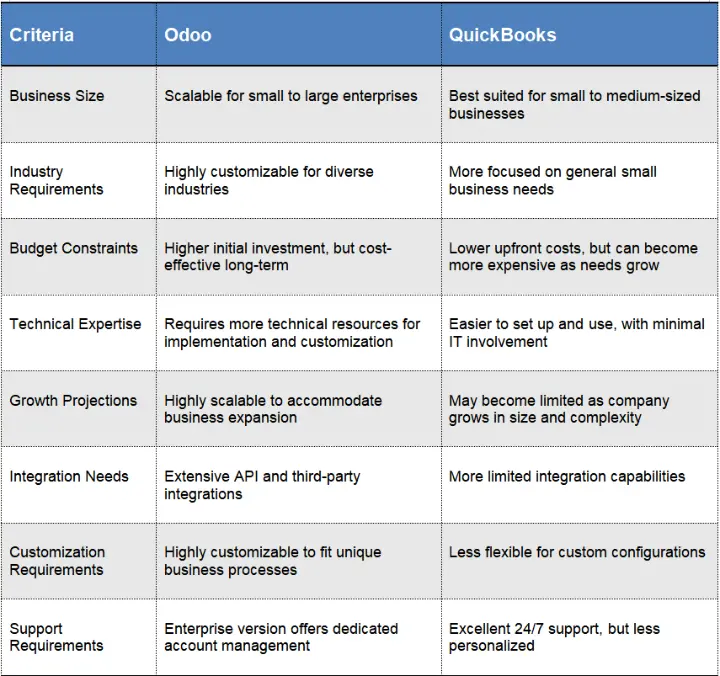
12. Conclusion
Both Odoo and QuickBooks are robust accounting software solutions, but they fulfill different business needs and priorities. QuickBooks is particularly good for straightforward simplicity and ease of use. It's a great solution for small businesses with simple accounting needs, while Odoo is more comprehensive and adaptable as an ERP system, suitable for large companies looking for advancement, integration, and high degrees of customization.
Use this guide and allow making an informed choice on the right accounting platform to drive your business' financial management and growth. Whether it is Odoo or QuickBooks, with this guide, you now know all the information and tools that you will be needing to make a well-informed choice.

